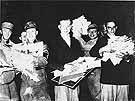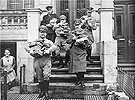
|
|
|

|

|

|

|
|
Click on an image to see a larger, more detailed picture.
|
|
|
|
|
| 1933: The Nazi State Begins |

|
pg. 68 |

|
|
|
|
| |
|
The Haavara Agreement In 1933 the German government signed a pact, called the Haavara (Transfer) agreement, with the Zionists. German law, formulated under the Weimar Republic, severely restricted the amount of property Jews could take with them if they emigrated to Palestine. Under the terms of the Haavara agreement, the assets of Jews leaving Germany for Palestine would be placed in special accounts, portions of which would be transferred (in the form of German goods) to Palestinian banks. The pact not only encouraged Jewish emigration--a positive development from the point of view of the Nazis--by allowing refugees to take a portion of their assets with them, but it also assured that those German Jews who arrived in Palestine would not be penniless. That was an extremely important consideration for the British, who held the mandate on the region. Under the terms of the agreement, about 40,000 Jews escaped the Holocaust by emigrating to Palestine.
|
 Students and Nazi Storm Troopers carry reams of blacklisted materials to a bonfire on Berlin's Opernplatz. The nazification of public schools and universities proceeded at a breakneck pace during the first year of Hitler's rule. Teachers and professors who opposed the Nazis' intellectual agenda were dismissed, and curricular materials that reinforced the racial ideology of Nazism were implemented throughout the country. Because Germany's youth were instrumental in Hitler's plans to dominate the world, their education and upbringing greatly concerned the Nazi authorities.
Students and Nazi Storm Troopers carry reams of blacklisted materials to a bonfire on Berlin's Opernplatz. The nazification of public schools and universities proceeded at a breakneck pace during the first year of Hitler's rule. Teachers and professors who opposed the Nazis' intellectual agenda were dismissed, and curricular materials that reinforced the racial ideology of Nazism were implemented throughout the country. Because Germany's youth were instrumental in Hitler's plans to dominate the world, their education and upbringing greatly concerned the Nazi authorities.
Photo: National Archives/United States Holocaust Memorial Museum Photo Archive
|
 On May 10, 1933, organized book burnings occured throughout Germany. Libraries, public buildings, private offices, and homes were searched for offensive materials. The campaign to homogenize German cultural and intellectual life undermined the principles on which democratic societies are based. Nazi terror and public apathy led to the disintegration of the freedoms and institutions central to Western democratic traditions.
On May 10, 1933, organized book burnings occured throughout Germany. Libraries, public buildings, private offices, and homes were searched for offensive materials. The campaign to homogenize German cultural and intellectual life undermined the principles on which democratic societies are based. Nazi terror and public apathy led to the disintegration of the freedoms and institutions central to Western democratic traditions.
Photo: Bildarchiv Preussischer Kulturbesitz/United States Holocaust Memorial Museum Photo Archive
|
|

|

|

|

|
 July 20, 1933: The Vatican signs a concordat with Germany. Pope Pius XI considers the treaty as protecting Catholic rights in Germany. However, by this action the Vatican helps legitimize the Third Reich in the eyes of the German Catholic hierarchy and laymen as well as of the international community. As a result, the concordat helps pave the way for the Nazi totalitarianization of German society and later German attacks on the European state system.
July 20, 1933: The Vatican signs a concordat with Germany. Pope Pius XI considers the treaty as protecting Catholic rights in Germany. However, by this action the Vatican helps legitimize the Third Reich in the eyes of the German Catholic hierarchy and laymen as well as of the international community. As a result, the concordat helps pave the way for the Nazi totalitarianization of German society and later German attacks on the European state system.
|
 July 31, 1933: Approximately 30,000 people are by now interned in Nazi concentration camps.
July 31, 1933: Approximately 30,000 people are by now interned in Nazi concentration camps.
|
 August 20, 1933: The American Jewish Congress announces its members will boycott German goods and services.
August 20, 1933: The American Jewish Congress announces its members will boycott German goods and services.
|
|
|
|
|
| 1933: The Nazi State Begins |

|
pg. 68 |

|
|
The Holocaust Chronicle
© 2009 Publications International, Ltd.
|
|
